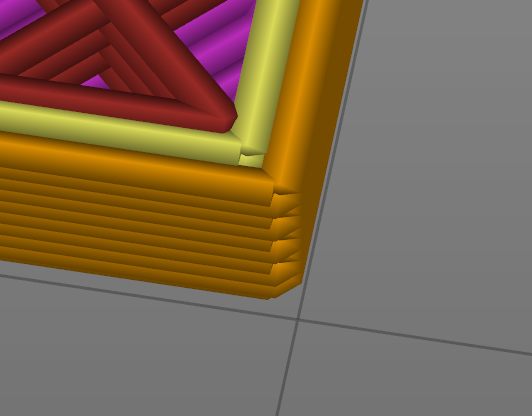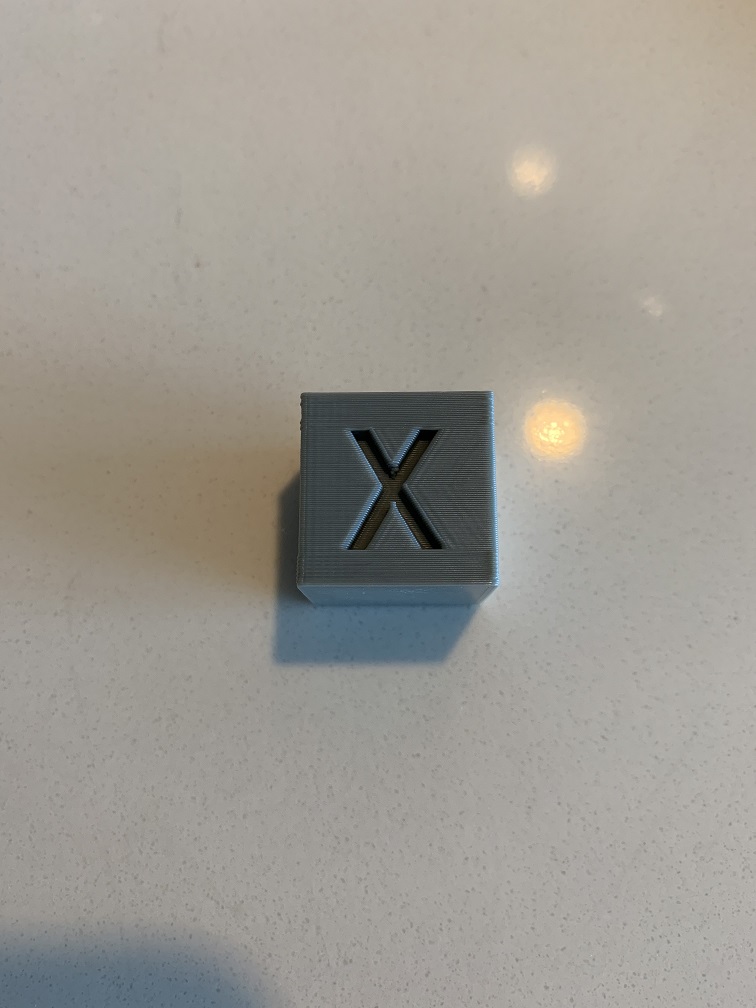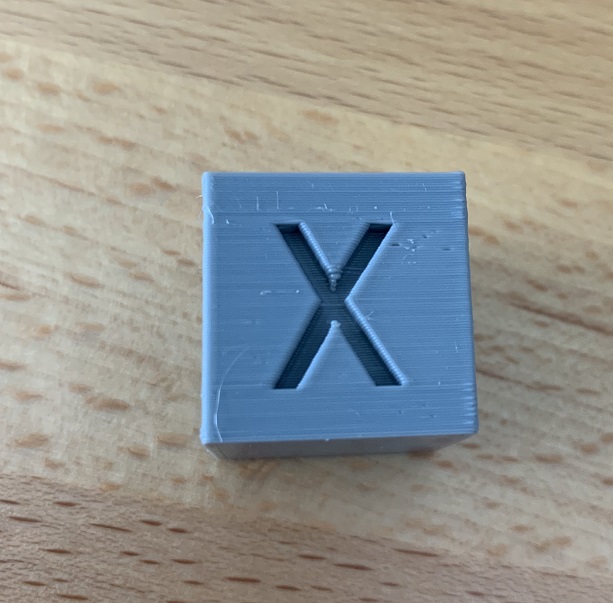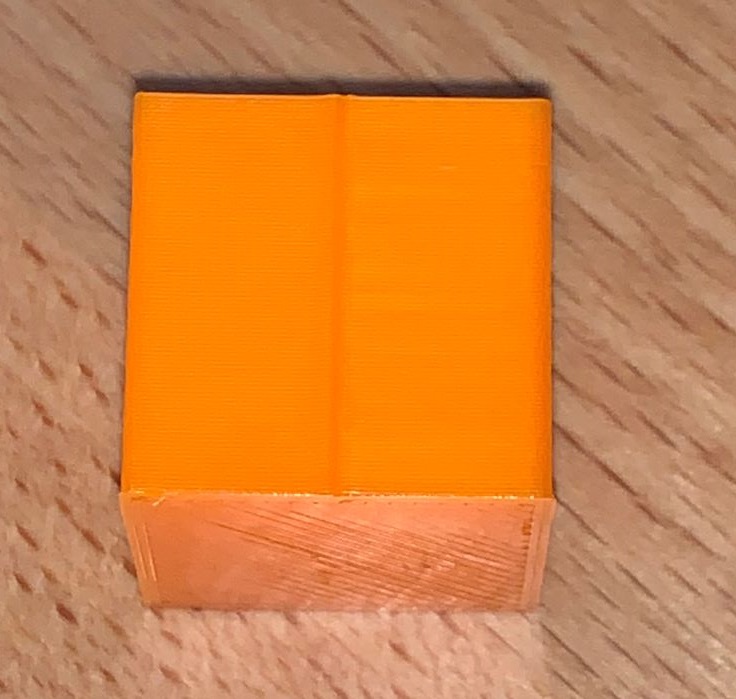Blobbing/zitting that wipe/retract won't fix?
-
Silly me, you're absolutely right. Sorry, I missed that. However, that begs the question, do you still see the same artifacts if you turn off the wipe feature?
-
Yup! Turned off wipe, turned off retraction, tried MASSIVE wipes and MASSIVE retractions, it doesn't change much. Turning PA up had the most effect so far but it seems crazy to have a direct drive at S0.1 when the recommended is S0.05 or lower. Even then, these zits are still there.
Is it possible that this is just a limitation of FDM? I've seen from a couple of posts on Reddit and even here that Z-seams are just a fact of life with FDM and that turning a setting on might fix it now but will cause problems later (coast in this case?).
-
@shensmobile There is always a visible seam with FDM but not big zits like you have.
When a new line is started the un-retract needs to advance the filament enough to have the correct pressure for the flow rate of the new line and it has to do it fast enough that the amount of filament extruded while stationary is just enough to make the start of the line.
If you have just done a fast infill line and you retract and then move to a slow outline the un-retract needs to be shorter because less pressure is needed for the slower flow rate.
I am not familiar with modern pressure advance, etc. I simply print with constant flow rate for infill and outlines. Since infill is slightly bigger cross section I actually do infill a little slower than outlines. That means that my retract and un-retract are always the same distance because I always need the same pressure. Then it is just a matter of making the un-retract fast enough to not make a blob.
You probably need to let the firmware manage the retract and un-retract rather than the slicer if the slicer is using constant distances regardless of the flow rate.
-
@shensmobile said in Blobbing/zitting that wipe/retract won't fix?:
Turning PA up had the most effect so far but it seems crazy to have a direct drive at S0.1 when the recommended is S0.05 or lower.
Every hot end and printer configuration is different. No disrespect to @dc42 intended but that figure of 0.05 in the Wiki comes from his own experience when he first introduced PA, on his own machine. It isn't based on extensive user experiences with different machines and configurations.
I've done a lot of testing with PA. On my machine which has short (200mm or so) Bowden tubes, the best setting for me is between 0.4 and 0.5 depending on filament type and some other factors. Basically anything that affects filament viscosity, will have an effect on what pressure advance you need to use. Nozzle diameter too is very important - a larger nozzle needs less that a smaller one. But, once you have found a value that works with a particular nozzle/filament/temperature combination, that value will work across all speeds up to 300 mm /sec print speed (and yes I do mean 300mm/sec and yes I have demonstrated that but you do need multiple extruders and multiple melt chambers).
So my advice would be to ignore the suggested Wiki values and find what works best for you on your machine. You may end with 0.2 or even higher. You will almost definitely need to use less retraction once you have found the best PA value.
-
@nophead I definitely need to look into firmware retract. It makes sense that the printer should adjust retract based on speed and flow rate. I am curious about why un-retracting is what prevents blobs. When you're un-retracting, aren't you adding material into the extruder, increasing pressure? In that case, I would think that unretracting too early/quickly is what causes blobs. I'm trying to wrap my head around the fundamental principals here at play.
And yes, my slicer is definitely doing the same amount of retract/unretract no matter what is actually being done. Pressure Advance is supposed to account for this, by adjusting flow rate based on extruder changes, but it actually increases pressure at the start of lines.
@deckingman I'll try higher PA for sure today then. I accidentally went to 0.4 (thinking it was 0.04) and the Titan just made clicking noises all print, so that's probably too much, but I'll definitely try some larger values than 0.1 and see if it improves these zits.
Thanks for your help everyone
-
@shensmobile said in Blobbing/zitting that wipe/retract won't fix?:
..............I accidentally went to 0.4 (thinking it was 0.04) and the Titan just made clicking noises all print, ..........................
That could be significant - not the highish PA, but the fact that the Titan made clicking noises when tried it. It shouldn't so are you sure you haven't got a shot bearing or cracked extruder cover?
-
@shensmobile said in Blobbing/zitting that wipe/retract won't fix?:
When you're un-retracting, aren't you adding material into the extruder, increasing pressure? In that case, I would think that unretracting too early/quickly is what causes blobs.
When you retract at the end of the last line it should be far enough to drop the pressure to zero so that you can move without leaving a string. Then at the start of the new run you need to un-retract enough to generate the correct pressure for the next line, so that as you move off the filament is flowing at the rate that matches the start speed.
During the time it takes to un-retract some filament will flow proportional to the integral of the pressure as it ramps up from zero. You need to un-retract fast enough that integral is only enough plastic to go from the nozzle to the layer below and be as wide as the filament path. If you un-retract too far, or too slowly you would get a blob.
-
Here are the settings I use for my Titan Aero. The seam is unavoidable, but yours is rather noticeable.
Here's what I've found to work well with my Aero. The seam is barely noticeable. Usually 2 or 3 perimeters, inside first. No wipe or coasting. Retract on layer change, retract before outer wall both enabled. Minimum travel before retraction is 2mm.
M201 X6000 Y6000 Z60 E4000 ; Set maximum accelerations (mm/s^2) M203 X15000 Y15000 Z600 E8000 ; Set maximum speeds (mm/min) M204 P1000 T4000 ; Set printing and travel accelerations M566 X900 Y900 Z60 E4000 ; Set maximum instantaneous speed changes (mm/min) (Jerk) M572 D0 S0.035 ; PRESSURE ADVANCE M207 S0.85 R-0.000 F3200 T2600 Z0.0 ; Firmware RetractionI think the big difference between our settings is the extruder jerk and acceleration.
-
@deckingman Just put new bearings in and the Titan Aero has the metal cover, so I don't think so to either of those. I think the clicking was because with a PA of 0.4 on such a small object, during infill, it would basically be retracting and unretracting constantly at every zig zag.
@nophead Ah that makes a lot of sense. Calculus was a clever way of explaining that concept. I'm gonna try increasing my jerk/accel again and increase the retract speeds
@Phaedrux thank you so much for your settings. I'm gonna try those next. Is everyone using firmware retraction? I presume that firmware retraction means that you aren't able to do retraction during wipes? Also, sorry for the dumb question, but what's the advantage of firmware retraction? In another post, dc42 seemed to confirm that firmware retraction is basically the same as issuing a G1 E# F# command, which is what slicing software already builds in. Does the duet do some other calculations with firmware retraction to improve print quality?
Will report back after trying all of these suggestions. I may stick to a PA of 0.05 for now and see if the increased jerk/accel for extruder, as well as increased retract speeds, will help.
-
PA at 0.15 with extruder jerk/accel/retraction speed increased to @Phaedrux settings: https://imgur.com/a/qopefEY
Honestly doesn't look any different than my other prints. Watching this print though, I think that my original hypothesis was either incorrect or has been fixed with the new settings. The start of the inner perimeter no longer has a large blub at the beginning; however, when it finishes the inner perimeter and moves to the outer perimeter, it almost feels like it's oozing a bit during the tiny, fraction of a mm travel and it creates a large "extrusion" between the two layers that the extruder runs into at the end of the outer perimeter.
I'm running a PrusaSlicer generated file now with my old retraction/PA settings, except I noticed that PrusaSlicer is doing the external perimeters slower than I'm telling it to. Watching it print slowly, I see that it's producing the tiniest little "extra extrusion" when it goes from inner perimeter to outer perimeter, probably because it doesn't have as much pressure built up in the nozzle.
-
Firmware retraction can be adjusted on the fly, so it's useful during the tuning phase. There are a few other situations where firmware retraction is required, like mixing hotends to be able to retract all of the extruders at once. Other than that there isn't much difference than setting the slicer to do it. the slicer can also control some wipe and coast features which may be beneficial, though pressure advance is usually enough to make those unnecessary. Simplify3D can be configured to use firmware retraction, a quick google should find the steps.
Can you post a .3mf from PrusaSlicer so we can see what the entire printer setup and print settings are?
-
@phaedrux Sorry it's taken so long for me to get back to you. I went on vacation shortly after your last message.
I've been tinkering all morning, even designed a new "calibration" print to figure out what's the optimal PA value to use, and... yeah still nothing. The biggest improvement is still going from Simplify3d to PrusaSlicer, and it's because PrusaSlicer has "coast" sort of built in. That is, on the outer perimeter, it stops before it completes the loop to account for the extrusion width at the start and end of the perimeter.

I simulated this in Simplify3d by adding 0.5mm coast and it helps a lot there too.
Here's the best print I've gotten so far today, using PrusaSlicer:

I know there's quite a bit of ringing, I have to turn down the jerk on XY and that'll fix that right up (I copied your settings you posted blindly, whoops). The zits/seams on the corners are much better, but they're still there.
And here's the .3mf for this print job: https://www.dropbox.com/s/aw8wqs696kqcvnt/xyzCalibration_cube.3mf?dl=0
I've gone through what it could possibly be, logically, and I'm stumped. I'm starting to wonder if my tension isn't high enough on my idler and PA isn't able to jerk the filament up fast enough, or if it's just this filament. I am using the most garbage PLA I have right now to run these tests, I wonder how much of an impact it has. I'm printing at a pretty low temp (180c) so retraction/PA should have more of an impact on blobs/zits, but it doesn't seem to change much if I print hotter. I'm going a little nutty-bananas now

-
Coast-to-end is a poor substitute for pressure advance.
Small blobs/zits are cause by insufficient retraction. My experience is that without pressure advance and with ordinary PTFE tubing and 1.75mm PLA, the retraction length need to be a little less than 1% of the Bowden tube length. With the correct pressure advance and with Capricorn tubing, it can be reduced.
-
@dc42 100% agreed, I hate that I'm using coast. That's why I don't want to use it, although in PrusaSlicer's case, it's a tiny coast just to account for the thickness of the line that gets extruded, so I can see why they included it by default.
I have 1mm of retraction right now, and e3d recommends less than 1.5mm for retraction (I believe). Any more than 2mm and I get jams/clogging. I just went through that brutal experience before my vacation. It's a direct drive, so no bowden tube here. I should be able to get away with small retraction.
I'm going to try with no wipe and see if PA can do its job more effectively. That's the only variable I haven't eliminated.
Update:

Disabled wipe, upped retraction to 1.5mm. Ignoring the stringing and the gaps (this filament pops/fizzes a bunch, I think it has a ton of moisture in it, it's almost 6 years old), I think this is the best looking blobbing so far. Now what do I try from here?
-
@shensmobile said in Blobbing/zitting that wipe/retract won't fix?:
Disabled wipe, upped retraction to 1.5mm. Ignoring the stringing and the gaps (this filament pops/fizzes a bunch, I think it has a ton of moisture in it, it's almost 6 years old), I think this is the best looking blobbing so far. Now what do I try from here?
Better filament!
-
I printed with higher quality filament and the seam/sitting is definitely still there. I did the calibration cube again with the following settings:
2mm retract
60mm/s retract speed
No wipe/coast
180c print temp
Aligned seam at the rear of the cubeHere's the seam along the back:

The rest of the print is fantastic (no voids, straight walls, great looking X and Y cutout) but this damn seam is still there. What's crazy is that I upped PA from S0.05 to S0.09 gradually throughout the print. The seam doesn't seem to be improving at all, and neither do the corners or the look of the top infill. I almost feel like maybe PA isn't taking?
The command I'm supposed to be issuing at the start of the file to trigger PA is M572 D0 S0.05 right? And inserting that command (with a new S value) at various points in my GCode should change PA from that point onwards, right? If so, I wonder if there could be another configuration setting that's preventing PA from being effective.
-
I think what you're seeing there is related to the fact that retraction isn't instant. If it's retracting there, and if you're not doing retraction during a wipe, the nozzle will have to stop there momentarily to do the retraction, and that non-zero time spent with not-yet fully retracted filament is simply causing that extra little bit that blobs slightly at the start and end points, making that seam. If you're not retracting there, and it's going from one side of that seam into interior lines, then some combination of PA and acceleration and jerk in X or Y might reduce that, but you'll almost certainly never get rid of it completely.
What would be an interesting test, if you want to insert g-code in at various levels of the print to see the effect, would be to start with low jerk, acceleration, and max speed of your extruder, and up those values at certain intervals, and see if the seam changes in appearance. I'll bet it does. Up to a point, anyway; beyond a certain speed, depending on the extruder, you simply might be unable to retract it any faster without stripping and slipping.
-
@shensmobile said in Blobbing/zitting that wipe/retract won't fix?:
The command I'm supposed to be issuing at the start of the file to trigger PA is M572 D0 S0.05 right? And inserting that command (with a new S value) at various points in my GCode should change PA from that point onwards, right? If so, I wonder if there could be another configuration setting that's preventing PA from being effective.
Yes, assuming the tool you print with uses extruder drive 0 (D0 in the corresponding M563 command).
What retraction speed do you use?
-
I don't think that seam is that bad honestly. Perfect cubes and cylinders don't give the seam hiding algorithm much to work with. It's always going to be visually apparent when it's exposed on a flat face like that. Most models have nooks and crannies or sharp corners that can be used to mask the seam location.
I noticed that the new Cura 4.2 has s smart seam setting that supposedly helps hide it better. Maybe give that a try with a more complex model.
-
@sethipus said in Blobbing/zitting that wipe/retract won't fix?:
I think what you're seeing there is related to the fact that retraction isn't instant. If it's retracting there, and if you're not doing retraction during a wipe, the nozzle will have to stop there momentarily to do the retraction, and that non-zero time spent with not-yet fully retracted filament is simply causing that extra little bit that blobs slightly at the start and end points, making that seam. If you're not retracting there, and it's going from one side of that seam into interior lines, then some combination of PA and acceleration and jerk in X or Y might reduce that, but you'll almost certainly never get rid of it completely.
What would be an interesting test, if you want to insert g-code in at various levels of the print to see the effect, would be to start with low jerk, acceleration, and max speed of your extruder, and up those values at certain intervals, and see if the seam changes in appearance. I'll bet it does. Up to a point, anyway; beyond a certain speed, depending on the extruder, you simply might be unable to retract it any faster without stripping and slipping.

Cube on left is without wipe, cube on right is with wipe. Doesn't appear to make a difference. I think the issue is that PA is appearing to do nothing. Even if marginal, my printer is not doing anything different at different PA values.
@dc42 said in Blobbing/zitting that wipe/retract won't fix?:
@shensmobile said in Blobbing/zitting that wipe/retract won't fix?:
The command I'm supposed to be issuing at the start of the file to trigger PA is M572 D0 S0.05 right? And inserting that command (with a new S value) at various points in my GCode should change PA from that point onwards, right? If so, I wonder if there could be another configuration setting that's preventing PA from being effective.
Yes, assuming the tool you print with uses extruder drive 0 (D0 in the corresponding M563 command).
What retraction speed do you use?
60mm/s. I wonder if it's because my extruder accel/jerk are too high. They're at 4000/4000, perhaps when PA is doing its thing, my extruder can't keep up with those values and slips? If that sounds reasonable, which do you think would be most effective to drop? Accel or Jerk?